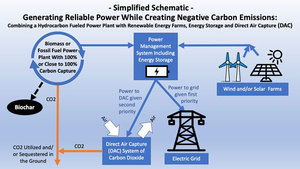Report discusses role of BECCS in reaching net zero goal
Energy Disrupter
ADVERTISEMENT
The latest Drax Electrical Insights Quarterly report, published by Imperial College London, discusses the U.K.’s transition from coal to biomass and the future of carbon-negative bioenergy with carbon capture and storage (BECSS).
According to the report, during the first quarter of 2021, Britain moved closer to its 2024-’25 target of completely phasing out coal power. Drax, which operates the U.K.’s largest power station, announced on March 5 that it had ceased commercial power generation from goal after 47 years. Only two coal power stations in the U.K. are still operating, as 85 percent of the country’s coal fleet have retired over the past decade.
While coal generation decreased, biomass generation hit new record highs during the first quarter. Biomass power stations in Britain generated 3.81 gigawatts (GW) on March 27, setting a new record. The report notes that biomass output is likely to continue to grow, with a new biomass-powered combined-heat-and-power (CHP) unit at Teesside expected to come online later this year.
Globally, biomass supplies approximately 2 percent of the world’s electricity. In Europe, it’s share is higher at 6 percent. In the U.K. alone, however, biomass accounted for 11 percent of power generation last year.
In the U.K., National Grid ESO’s Future Energy Scenarios show biomass is expected to play an increased role in the country’s energy future. The report notes that those scenarios show that deployment of BECCS means annual carbon emissions from electricity generation could be negative by as soon as 2030. By the mid-2030s, BECCS could be removing 40 million metric tons per year of carbon dioxide from the atmosphere, according to the report. That is comparable to total annual emissions in 2020.
The U.K. Association for Renewable Energy and Clean Technology (REA) issued a statement on the report, noting the U.K.’s record on bioenergy offers the world a pathway to net zero emissions. “Sustainable biomass has been key to the U.K.’s decarbonization success so far and has supported the expansion of variable renewables like wind and solar,” said Nina Skorupska, CEO of the REA. “Negative emissions through bioenergy with carbon capture and storage will be vital to achieving our net zero targets and will be delivered by building on the U.K.’s world-leading biomass sectors and adhering to strict science-led sustainability governance.
“We look forward to the publication of an update this summer on the upcoming Biomass Strategy, which we hope will provide a clear direction for the further development of the bioenergy sector over the coming years,” she added.
Iain Staffell, lead author of Electric Insights, said, “The versatility of sustainable biomass for electricity generation is an overlooked success story in the U.K. It has helped the U.K. to rapidly decarbonize its power sector and looks set to continue to deliver key strategic benefits through bioenergy with carbon capture and storage and the potential for negative emissions.”
















